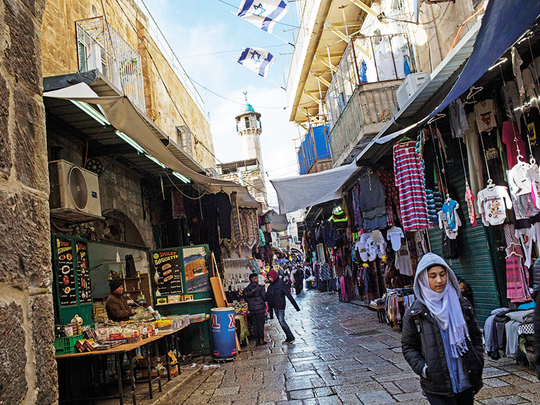
Jerusalem has always been an occupied city — ruled by the Romans, Turks, Jordanians, British and now the Israelis. It has never been the capital of any, but Israel — since capturing it from the Jordanians in 1967 — has claimed it as its capital. At the same time, Palestinians have long-sought the eastern part of the occupied city as the capital of their future state.
On December 6, 2017, United States President Donald Trump recognised occupied Jerusalem as the capital of Israel, upending decades of US diplomacy. Trump said that he would eventually relocate the US embassy in Israel from Tel Aviv to occupied Jerusalem
Palestinian political analysts based in occupied Jerusalem immediately voiced disapproval. President Trump’s recognition of the city as Israel’s capital is a glaring violation of international law and the legal status of occupied Jerusalem cannot be changed by unilateral action. What’s more, Trump’s decision irreparably harms negotiations to solve the decades-old Israeli-Palestinian issue peacefully.
On December 21, the UN general assembly voted 128-9 in favour of a draft resolution rejecting Washington’s controversial move during a rare emergency session.
Rabbi Yaakov Shapiro, who heads an Orthodox congregation in Queens, New York, that rejects the concept of Zionism, spoke out: “[Occupied] Jerusalem is not the capital of the Jewish people. Countries have a capital, that is a definition of a capital. The Jewish people are not a country, they are a religious community. We pray towards [Occupied] Jerusalem, but we relate to [Occupied] Jerusalem only as a holy city, not as a political capital city of the Jewish people.”
Palestinians in general believe historically that occupied Jerusalem is a city of co-existence for all peoples and all religions. It had always been that way until Israel was created about 70 years ago. It was in Jerusalem that Jesus had once walked, preaching love and faith, and it was here that Prophet Mohammad (PBUH) ascended to heaven.
Following Trump’s declaration, Israeli legislators on January 2 approved a bill that makes it more difficult to divide occupied Jerusalem. The bill stipulates that two-thirds support is needed in the Israeli parliament before Israel can relinquish control over any portion of the holy city to a foreign entity. The bill is intended to make it extremely difficult to give up part of occupied Jerusalem to the Palestinian Authority, which wants the city’s eastern half to be the capital of an independent Palestinian state.
An equally disturbing stipulation in the bill is that it removes two Palestinian neighbourhoods, Kufr Aqab and the Shuafat refugee camp, from the occupation’s municipal jurisdiction of the city.
On January 14, at a key meeting in Ramallah of the Palestinian Central Council — a high-ranking arm of the Palestine Liberation Organisation — Palestinian leader Mahmoud Abbas did not mention the recognition but said the Oslo accords that led to the creation of his Palestinian Authority and envisioned a final resolution to the conflict were in effect finished.
Weekend Review canvassed opinions from a cross-section of Palestinians living in occupied Jerusalem about this development and how it would impact their lives.
Mounir Kliebo, a resident of occupied Jerusalem expressed concern. “Mr Trump is giving Israel a free hand to erase the Palestinian Jerusalemite historical, political, cultural and demographic presence in [occupied] Jerusalem. This will encourage Israeli officials to further intensify their violations of Palestinian human rights in the city and will lead to more property confiscation. More homes will be destroyed and more Palestinian families will be kicked out of their homes. Palestinian Jerusalemites will no more have the right to reside in the city where they were born and raised and where their families still live. Israel has revoked the rights of more than 14,000 Palestinians since 1967. This decision has put an end to the dream of peace in the region and I am afraid that this decision will follow the same process that the Balfour Declaration followed a century back.”
“Despite the votes and support we have from the international community, actions should be taken on all levels, without a political will from them, from our Palestinian leadership, Palestinian political parties and from the public and individuals, the future of Palestinians in [occupied] Jerusalem will be like what has happened in Haifa, Yafa and Nazareth.”
“Palestinians in [occupied] Jerusalem are feeling completely isolated. We are on our own, and perhaps it’s an appropriate time to reevaluate our position as Jerusalemites and come up with a Jerusalem-led strategy on the Palestinian national movement and the future of the city being the heart of the Palestinian struggle. We must start the discussion on perhaps adjusting our struggle from a struggle of independence to a struggle of equal rights within the state of Israel. This is a major turning point, and with an obvious lack of leadership in [occupied] Jerusalem, the discussion will be difficult and painful, but it is imperative that we start it openly and constructively.”
Ahmad Abdullah, a political science student at the Hebrew University in Jerusalem expressed a sense of optimism. “God bless Trump! He took a huge rock and threw it into the stagnant swamp, and created movement. This action brings Palestine and [occupied] Jerusalem back on the table and to centre stage. Off course Trump and the Israelis have their own agenda, but I am optimistic that it will prove to be a huge mistake for them. [Occupied] Jerusalem will also take off the masks of everyone, and we will see who are our real friends and brothers and who are faking it and pretending to care.”
“As a Palestinian born and raised in [occupied] Jerusalem I believe that my hometown is not for sale, and it’s not his decision and won’t affect me at all. Trump has control over his own states. He can declare Kentucky the capital of Israel but not [occupied] Jerusalem. We woke up the next day and continued business as usual, but it left a scar that will take a long time to heal.”
“Personally, nothing will change, unless Israel grants us passports, which will not happen. My fight for justice will continue and unlike the vast majority, I’d rather go to the Palestinian Authority than receive the social benefits like medical insurance from the Israelis.”
Most Palestinians in [occupied] Jerusalem hold permanent resident status, not Israeli citizenship, and their status can be revoked at any time for multiple reasons, forcing them to leave the city. Some have accepted Israeli citizenship, like those living in Israel proper or Palestinian pre-1948 areas. However, those who have not, remain caught up in a classic Catch 22 conundrum in that they enjoy social benefits such as health insurance, although they are discriminated in myriad ways and are treated like second-class residents. On the other hand, should they fall under the rule and jurisdiction of the Palestinian Authority whom most perceive to be corrupt and not representative of their interests, they would lose their social benefits, especially health insurance.
Given these realities, what options do the Palestinians have now? For the past 50 years, the state of Israel has held sovereignty over all those who live in [occupied] Jerusalem yet Israel grants citizenship and the right to vote only to the Jewish population living in the city and denies this right to about a third of the population made up of Palestinians.
Salim, a wise old taxi driver in the occupied city succinctly says: “Perhaps it is time for us Jerusalemites to demand the right to vote in the state that has ruled over us for over half a century. If [occupied] Jerusalem is the capital of Israel, then so be it. But let it be the capital of a democratic, multi-ethnic Israel that respects the rights and dignity of all, including us Palestinians, who live under its sovereign rule.”
Rafique Gangat, author of Bending the Rules, is based in Occupied Jerusalem.












